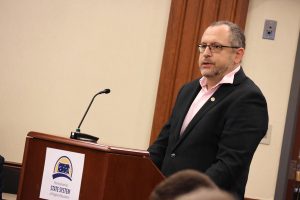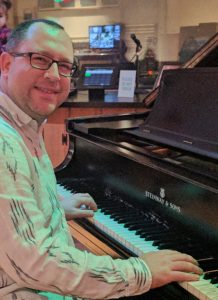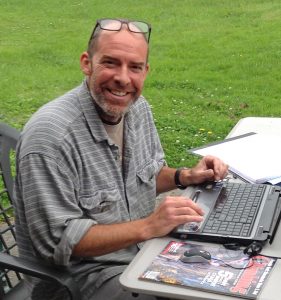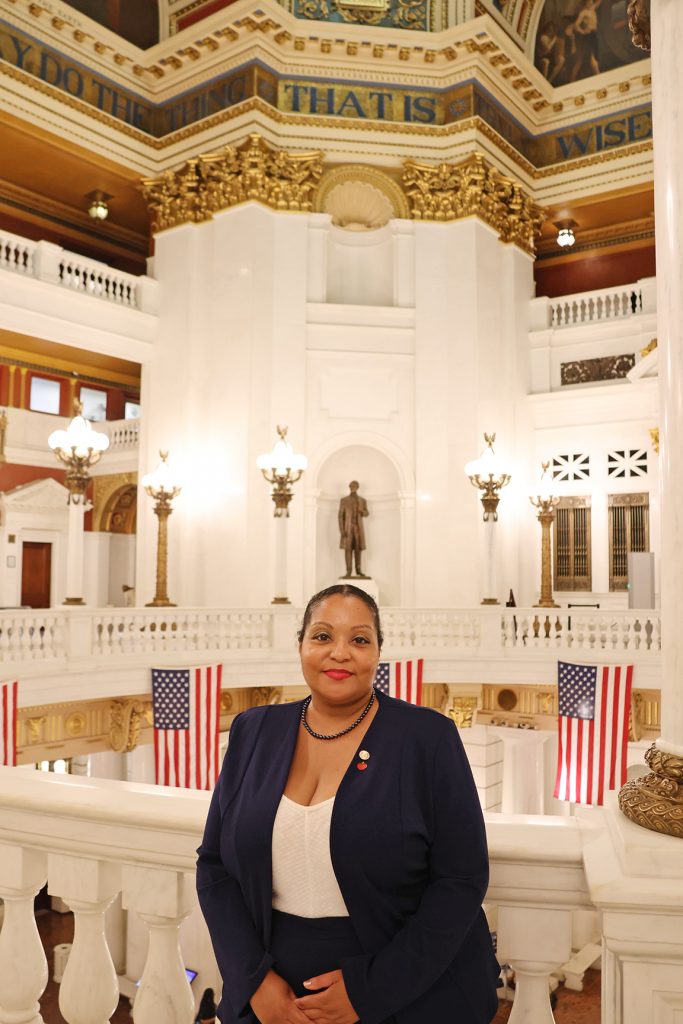Blog
Merger, Meteorology, and More: Meet Mario Majcen

California APSCUF Chapter President Mario Majcen speaks to Pennsylvania’s State System of Higher Education’s Board of Governors in mid-July 2025. APSCUF photo
Shortly after becoming his chapter’s vice president, Mario Majcen was part of a three-day strike in October 2016. Now, nine years later, he serves his chapter as president — and all of APSCUF as a statewide officer-at-large.
Majcen grew up and graduated from college in Croatia before immigrating to the United States. He got his master’s in meteorology from the University of Utah before moving to Pennsylvania for his Ph.D., which he received from Penn State in 2009, after which he became an assistant professor at California University of Pennsylvania.
“One of the differences between the offers that I got for the first job is that the faculty are unionized at California University as all PASSHE schools, and I decided to go there,” Majcen said.
He joined APSCUF the first day he was able to and has been increasingly more involved since. In 2013, Majcen was elected as an alternative delegate to the legislative assembly. Then in 2016 he was elected as Cal U’s APSCUF chapter vice president. He also became the mobilization chair.
“You know, they said, ‘Mostly nothing happens. It’s a really easy position,’ and of course, you know, that was the strike year,” Majcen said, reflecting on his position as mobilization chair.
Issues had been building before Majcen was elected.
“There was almost nothing sudden about this,” Majcen said about the strike, “Our negotiations to get a contract were stuck for a while … So everything was building towards that.”
A few years after APSCUF’s first and only statewide strike in its 88-year history, Majcen was part of the merger of Cal U, Clarion, and Edinboro into PennWest University. Despite hardship during this time, there were benefits.
“I have met some amazing people in union chapters in Edinboro and Clarion that I communicate and collaborate with now, so it makes the union much stronger,” Majcen said.
In 2022, Majcen became the California APSCUF chapter president. This past April, he ran for officer-at-large.
“During that consolidation process, I acquired experience going through that and knowing how to solve problems,” he said. “And I decided that I want to make an impact and help on a state level, having that expertise, especially in a sense of how I could enhance collaboration between different chapters.”

Dr. Mario Majcen visits RCA Studio B in Nashville, Tenn. Photo/Submitted
Before taking on his responsibilities with APSCUF, Majcen teaches classes in meteorology. This fall he will teach an introduction to weather and climate, along with two lab sections.
“Frankly, I can’t wait to teach that class,” he said. “It’s an awesome class. It’s every student who comes to that class. And it’s not for majors. It’s general education. I like engaging with students from different backgrounds. This is definitely a job where I feel that I’m making a difference.”
There is another reason why he enjoys teaching.
“Helping the students succeed is the way, and probably the only way, that I can pay back
to my professors,” Majcen said. “I cannot pay back for the time they spent helping me. So one way of, you know, kind of returning the favor is to help the future students. I enjoy that a lot.”
—Ian C. Hall,
APSCUF intern
See Dr. Mario Majcen’s remarks to the Board of Governors – July 17, 2025
The July 17 Board of Governors meeting streamed via YouTube. Below are Dr. Mario Majcen’s comments as prepared.
Chair Shapira, Chancellor Fiorentino, governors, presidents, and guests,
My name is Mario Majcen. I am an at-large member of the APSCUF executive council and a professor at PennWest University. I also have served as California chapter president since 2022.
In my comments, I would like to reflect on statements that I read in the media about the ongoing consolidation of our universities that took effect in 2022. In those statements, the consolidation is portrayed as a success — and as a path that other systems of higher education should follow.
We are in the third year of this consolidation. We are not done, but we are getting close. And I can tell you from personal experience and from the data on enrollment, on impacts on student experience, and from the faculty perspective that there were many better alternatives in 2021 when this board decided to consolidate universities.
For the last four years since the decision was made, the best phrase to describe the consolidation is “building an airplane while flying it.” Not my words; this description comes from one of the four university presidents that I served under in the past four years, who did her best to keep our recently consolidated airplane from crashing to the ground.
I am not here to argue for reversing the consolidation. I am just asking for objectivity in assessing its impacts.
The consolidation was done without a detailed implementation plan, but with just a concept which two newly formed universities had to figure out how to implement while still doing everything else that needs to be done to serve our students in the best possible way and provide the high-quality education that they expect and deserve.
Hindsight is 20/20, they say. I wouldn’t know; my sight hasn’t been that good in a few decades. But IF the hindsight is indeed 20/20, then let’s learn lessons from this experience and not glorify it as a success.
Our faculty, staff, and administrators worked on new policies, new curriculum, new procedures. Only to redo them. And sometimes again. It was an exhausting process that seemed to never end.
And now that we finally stabilized enrollment, we will be working on revising curriculum again, as we consider changes to our academic arrays.
As a professor and a former first-generation student, I am only asking for this: Give faculty time to focus on our students; give us time to work on professional development and learning new skills to transfer to our students; give us time for designing better and better lectures, labs, and hands-on activities for our students; and give us equipment and technology to deliver education in the best possible way for our students.
As you do that, please reflect on PASSHE being a system. Is PASSHE really a system, if students who pay the same tuition get very different experiences and opportunities, depending on which university they attend? Or are we just calling ourselves a system because of a few dozen Board of Governors policies that apply at all 10 universities with very different student experiences?
Regardless of any challenges that lie ahead, the faculty will, as always, be there for our students to ensure their success.
Thank you.
From construction to executive council: Meet James Guignard

James (Jimmy) Guignard’s term as State APSCUF faculty officer-at-large began June 1. Photo/Submitted
While working in construction for six years, James (Jimmy) Guignard saw some of the effects of not having a union. When he got to Mansfield University in 2005, he said joining APSCUF was a “no brainer.” Now, 20 years later, the professor sits as an officer-at-large on State APSCUF’s executive council.
Guignard was raised in North Carolina. He started his higher education career at Appalachian State University, where he graduated with a degree in communications. Afterward, he worked nonunion construction, where he witnessed lack of overtime despite working overtime hours, having to pay for his own insurance, and no security in the position. When he went back to college, Guignard started as an English-education major, but later changed to an English major, so he could go straight into grad school. He then went on to receive his master’s in English from Western Carolina University. Wanting to move west, Guignard went to the University of Nevada, Reno, for his doctorate. After learning and teaching there, he graduated with a Ph.D. in English composition and rhetoric.
After graduating from his doctoral program, Guignard applied to close to 70 jobs across the country, and received a position with what was then Mansfield University, one of his first-choice schools, as an assistant professor and director of composition. The rural setting and prominent history of mining and fracking continued Guignard’s interest in environmental rhetoric. Biking the trails and roads surrounding Mansfield during the Marcellus Shale boom inspired him to write his book, “Pedaling the Sacrifice Zone: Teaching, Writing, and Living above the Marcellus Shale.”
When he arrived in Mansfield, Guignard did not know a lot about how unions work, but he knew the challenges of not having one.
“I do have a strong sense that a lot of times, employers will not take care of their employees in the way that they should,” Guignard said.
This notion compelled him to join APSCUF.
“I started getting more involved in it because I started understanding more about what the union was doing,” Guignard said.
Then retrenchments came.
“I saw how the union was helping out with that,” he said.
Guignard’s colleagues later elected him as a delegate to APSCUF’s legislative assembly. This past academic year, a couple of members asked him about running for officer-at-large.
“I hadn’t even thought about it — like it wasn’t even on my radar,” Guignard said. After a conversation with his chapter president, Guignard decided to nominate himself for the position.
“We Mansfield, we Commonwealth, we the State System need to be represented in as many conversations as we can be,” Guignard said.
Officers-at-large have a vote on the State APSCUF executive council. In Guignard’s officer role, which he is still learning, he is also a member of the personnel committee.
Back on campus, the professor of English teaches classes on composition and writing. Guignard was department chair for eight years, including two years during the consolidation process.
One of his favorite parts of working as a professor is the students, Guignard said. He mentioned it is rewarding watching students graduate knowing that he was a part of their academic journey.
“I like the fact that I’m constantly learning stuff myself from students,” he said. “So I know what I know, and I think I have stuff to offer to students, but they also have stuff to offer.”
—Ian Hall,
APSCUF intern
This post has been updated to correct information about Guignard’s service as a department chair.
APSCUF hosts faculty intern from PennWest California
 We were delighted to have Associate Professor Candice Riley of PennWest California as our faculty intern last week. She visited the Harrisburg office to interact with staff members and observe the spectrum of union administration. Members, watch the APSCUF newsletter next year for information about the summer 2026 faculty/coach internship.
We were delighted to have Associate Professor Candice Riley of PennWest California as our faculty intern last week. She visited the Harrisburg office to interact with staff members and observe the spectrum of union administration. Members, watch the APSCUF newsletter next year for information about the summer 2026 faculty/coach internship.
APSCUF photo: Associate Professor Candice Riley of PennWest California visits the Pennsylvania Capitol June 10 during her APSCUF faculty internship.
A roundup of faculty and coach accomplishments: 2024–25
Over the last year, many of our APSCUF members have been recognized for their work. Here is a showcase of some of their accomplishments.
From Commonwealth-Bloomsburg, Susan Kocher picked up her 400th win as head coach of Huskies softball.
PennWest California art Professor Jim Bové went to the arctic and came back with a message about cross-discipline science, technology, engineering, art, and math (STEAM) instruction.
Cheyney University’s Chef Ian Baker shared some of his experience teaching students at the Cheyney Grille.
PennWest Clarion Assistant Professor Natasha Dias, adviser to the Clarion International Association, helped organize and host the 18th annual cultural night. Also, PennWest recognized her with a Keeper of the Flame award.
East Stroudsburg University’s Andy Gavalis, assistant professor of reading, and Ahmed Yousof, associate professor of art, media, and design, gave a presentation to faculty and students about neurodivergence in the classroom.
Associate Professor Camille Dempsey is the inaugural director of the new Center for Artificial Intelligence at PennWest Edinboro.
Indiana University of Pennsylvania Professor Alida Merlo marked her 30th year teaching criminology.
Professor Peg Speirs of Kutztown University was named Pennsylvania Art Education Association’s Outstanding Higher Education Art Educator in the fall.
Commonwealth-Lock Haven Professor Rick Schulze spoke about rural HIV outreach and prevention strategies at the PA Community and Public Health Conference.
Nick Mattis, the new cross-country coach of Commonwealth-Mansfield, led both the men’s and women’s teams to the PSAC championship.
Millersville Professor Dominique Didier led students in a hands-on learning experience where they sheared sheep.
Associate Professor Dhiman Chattopadhyay from Shippensburg University forged academic connections in India, enhancing student learning of conflict journalism.
Professor Sam Thangiah of Slippery Rock University showed off new holograms and talked about their usefulness.
For the seventh time in eight seasons, Pennsylvania State Athletic Conference named Steve Mazurek women’s swim coach of the year. PSAC also awarded him the title of men’s swim coach of the year.
Want to share a member accomplishment? Tag APSCUF on social media or email .
—Ian Hall,
APSCUF intern